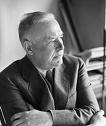
Almost 30 years ago, a friend gave me a copy of Collected Poems. and I was astounded. I still have that copy on my bookshelf, and I will periodically open it and just sit while I read from it. And I’m still astounded. Library of America published an edition of all of Stevens’ poems and prose in 1997.
Stevens is sometimes loosely grouped in the triumverate of great Modern poets, the others being T.S. Eliot and William Butler Yeats. Yet his poems, particularly the early ones, show the influence of the English Romantics and the French Symbolists.
Stevens composed his poems while commuting to and from work, and in the evenings. For National Poetry Month, here are three of them.
The Emperor of Ice-Cream
Call the roller of big cigars,
The muscular one, and bid him whip
In kitchen cups concupiscent curds.
Let the wenches dawdle in such dress
As they are used to wear, and let the boys
Bring flowers in last month’s newspapers.
Let be be finale of seem.
The only emperor is the emperor of ice-cream.
Take from the dresser of deal.
Lacking the three glass knobs, that sheet
On which she embroidered fantails once
And spread it so as to cover her face.
If her horny feet protrude, they come
To show how cold she is, and dumb.
Let the lamp affix its beam.
The only emperor is the emperor of ice-cream.
Man Carrying Thing
The poem must resist the intelligence
Almost successfully. Illustration:
A brune figure in winter evening resists
Identity. The thing he carries resists
The most necessitous sense. Accept them, then,
As secondary (parts not quite perceived
Of the obvious whole, uncertain particles
Of the certain solid, the primary free from doubt,
Things floating like the first hundred flakes of snow
Out of a storm we must endure all night,
Out of a storm of secondary things),
A horror of thoughts that suddenly are real.
We must endure our thoughts all night, until
The bright obvious stands motionless in cold.
The High-Toned Old Christian Woman
Poetry is the supreme fiction, madame.
Take the moral law and make a nave of it
And from the nave build haunted heaven. Thus,
The conscience is converted into palms,
Like windy citherns hankering for hymns.
We agree in principle. That’s clear. But take
The opposing law and make a peristyle,
And from the peristyle project a masque
Beyond the planets. Thus, our bawdiness,
Unpurged by epitaph, indulged at last,
Is equally converted into palms,
Squiggling like saxophones. And palm for palm,
Madame, we are where we began. Allow,
Therefore, that in the planetary scene
Your disaffected flagellants, well-stuffed,
Smacking their muzzy bellies in parade,
Proud of such novelties of the sublime,
Such tink and tank and tunk-a-tunk-tunk,
May, merely may, madame, whip from themselves
A jovial hullabaloo among the spheres.
This will make widows wince. But fictive things
Wink as they will. Wink most when widows wince.
- Poets and Poems: Alison Blevins and “Where Will We Live if the House Burns Down?” - July 1, 2025
- Poets and Poems: Paul Pastor and “The Locust Years” - June 26, 2025
- What Happened to the Fireside Poets? - June 24, 2025
Maureen Doallas says
That third poem is something else. Thank you for giving us a voice not so often heard these days.
Maureen Doallas says
Just want to share that my friend Diane Walk (Contemplative Photography) has the honor of seeing her poem “Something in Her Hands” on display at Wildernest, on Winslow Way, Bainbridge Island. Wildernest has set up a Poetry Corners exhibit for National Poetry Month. Congratulations to Diane. Her image poems are wonderful.
L.L. Barkat says
I have to admit I was not so enamored of Stevens when made to read him in grad school. These poems seem better, especially the first. 🙂
Ah, but this is why we need many poets in the world. Some speak to us, some don’t.
n davis rosback says
well…
i just think he was as cute as a button.
i hear he married elsie because he liked those wings she had on her head.
it doesn’t hurt that he used the word “hankering” in his poetry, i might add.
laura says
I enjoyed these like a bowl of ice cream 🙂
I posted a little poem today. This poetry month thing is making me lose my head 🙂